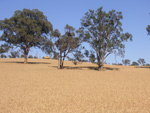 The submission of Charles Sturt University’s (CSU) medical school proposal has been welcomed by the co-Chair of CSU’s Medical Program Development Community Consultative Committee, Mrs Audrey Hardman, OAM, amid her calls for real action on the rural doctor crisis.
The submission of Charles Sturt University’s (CSU) medical school proposal has been welcomed by the co-Chair of CSU’s Medical Program Development Community Consultative Committee, Mrs Audrey Hardman, OAM, amid her calls for real action on the rural doctor crisis.“Almost one third of Australians live in rural areas, yet we have around half the doctors and health professionals per head of population compared to major cities,” Mrs Hardman said.
“At the same time, 4 600 people are estimated to die unnecessarily in rural Australia every year. That’s around 13 rural Australians dying every day.
“These are people, not just numbers. They are mothers, fathers, grandparents, aunts, uncles and children.
“We all know that one of the major reasons that we have high rates of illness and death in rural areas is a lack of doctors and other health professionals.
“Despite all this, we have only one full medical school operating in a genuinely rural area of Australia – James Cook University’s medical school in north Queensland.
“Rural Australians are right to ask why it is that there is just one genuinely rural medical school to serve the needs of 30 per cent of the Australian population.
“Rural Australians want to know why government has opened new medical schools in cities like Sydney, Melbourne, Adelaide, Gold Coast and Perth that have double the number of doctors compared to rural Australia, yet has only established one medical school in rural Australia since Federation.
“I think rural Australians had great hopes when the Minister for Health, Ms Nicola Roxon, MP, came to Bathurst in 2008 to give the Light on the Hill address and talked passionately about addressing inequalities in health service delivery in rural Australia.
“We thought, ‘finally a Government that understands the problem and is going to do something about it’.
“But what have we got? New GP super clinics without any GPs; the closure of more rural hospital emergency departments, such as Blayney; the NSW Government spending $59 million to fly in overseas doctors for weekends just to keep some rural emergency departments open.
“Governments of all persuasions have talked about how they are spending lots of money trying to get more Australian doctors into rural practice, but rural Australians know it’s not working. We are sick of talk, we want results.
“If the Government is serious about health reform in rural Australia, it has to significantly increase the number of doctors and health professionals who want to practise in rural areas. The only proven way to do this is to expand the number of rurally-based medical and health programs and places.
“This government says it is a reformist government. Well, if this is true then it must reform the way we deliver health and medical education for rural Australians.





Social
Explore the world of social